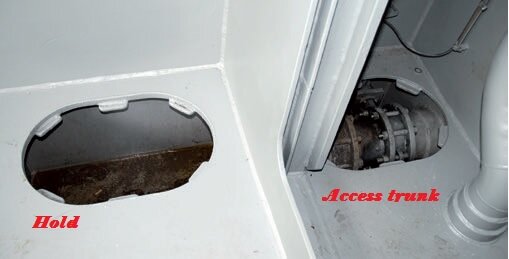

Home ||| Bulk Cargo ||| Planning ||| Care ||| Safety||| Self unloaders
Monitoring hold bilges during loaded passage of a bulk carrier

Many cargoes contain moisture that may accumulate at the bottom of the cargo hold and drain towards the hold bilges, raising the bilge level and possibly triggering the high level bilge alarm if fitted. This can also occur if there is any leakage into the cargo holds through hatch covers or from elsewhere.
If the ship is loaded with the same cargo in all holds and all the bilges indicate increased soundings, then it can be said with certainty that the water in the bilges has drained from the cargo. For example, a cargo of coal may contain up to 1% of its weight as moisture, which will drain into the bilges. Otherwise, it may indicate a particular leaking hatch cover or other leakage, which should be investigated
It is important to pump out water accumulated in the bilges to avoid:
- Excessive corrosion of the tank top. A pH test of the acidity of the bilge water is required
- difficulties during discharging cargo from the lower parts of a cargo hold flooded with accumulated water
- damage to adjacent cargo by flooding, eg pulp.
The bilges should be left nearly dry so that any other leakage into cargo holds can be detected by a rise in bilge level.
The handling of bilge water should be clarified in the charterparty or otherwise by charterer's instructions. As the moisture may amount to about 1% of the weight of the cargo, the quantity of cargo available for discharge would also be less. It is conceivable that charterers may try to forbid discharging of bilges, in which case advice should be sought from owners/ managers.
Bilges should be discharged overboard after keeping the pollution aspects in mind, ensuring that the quantity of water pumped from them is recorded in the sounding book or charterer's form. If bilges are discharged, a record should be kept in a format .

Always accessible bilge well
Bilge well A sump to which bilge water drains. It is important to arrange bilge wells in the way enabling permanent access and possibility of cleaning even when holds are loaded.
Related Info:
-
Procedure for cargo damage survey at discharging port
-
Requirement for ballast exchange ar sea
-
Risk of partially filled ballast tanks
-
Causes of structural damage and countermeasures
-
Deterioration of ships hull and consequences of hull damage /forward flooding
-
Bulk carrier hull damage - causes and preventive measures
-
How to avoid damage during cargo operation
-
How to arrange repair of damage during cargo loading/unloading
-
Bulk carrier water ingress problem
Related Information
- Additional cargo documents required for bulk cargo loading
- Suitability of Shore Terminals for handling bulk cargo
- Bulk carrier acceptability of loading regulation
- Preparation for ships carrying bulk cargo & standard loading condition
- Information to ship from terminal prior loading bulk cargo
-
Local loading criteria defining maximum allowable cargo weight in each cargo hold
Our detail pages illustrated many safety aspects of Bulk carrier
Home page |||Bulk carrier types ||| Handling of bulk coal |||Cargo planning ||| Carriage of grain |||Risk of iron ores |||Self unloading bulk carriers |||Care of cargo & vessel |||Cargoes that may liquefy |||Suitability of ships |||Terminal guideline |||Hold cleaning |||Cargo cranes |||Ballast handling procedure |||Bulk carrier safety |||Fire fighting systems |||Bulk carrier General arrangement

Operation of sea going bulk carriers involved numerous hazards . Careful planning and exercising due caution for all critical shipboard matters are important . This site is a quick reference to international shipping community with guidance and information on the loading and discharging of modern bulk carriers so as to remain within the limitations as specified by the classification society.
It is vital to reduce the likelihood of over-stressing the ship's structure and also complying with all essential safety measures for a safe passage at sea. Our detail pages contain various bulk carrier related topics that might be useful for people working on board and those who working ashore in the terminal. For any remarks please Contact us
Copyright © 2010 bulkcarrierguide.com All rights reserved.
Although every effort have been taken to improve the accuracy of content provided the publisher of this website cannot take responsibility for errors. Disclaimer Privacy policy Home page


